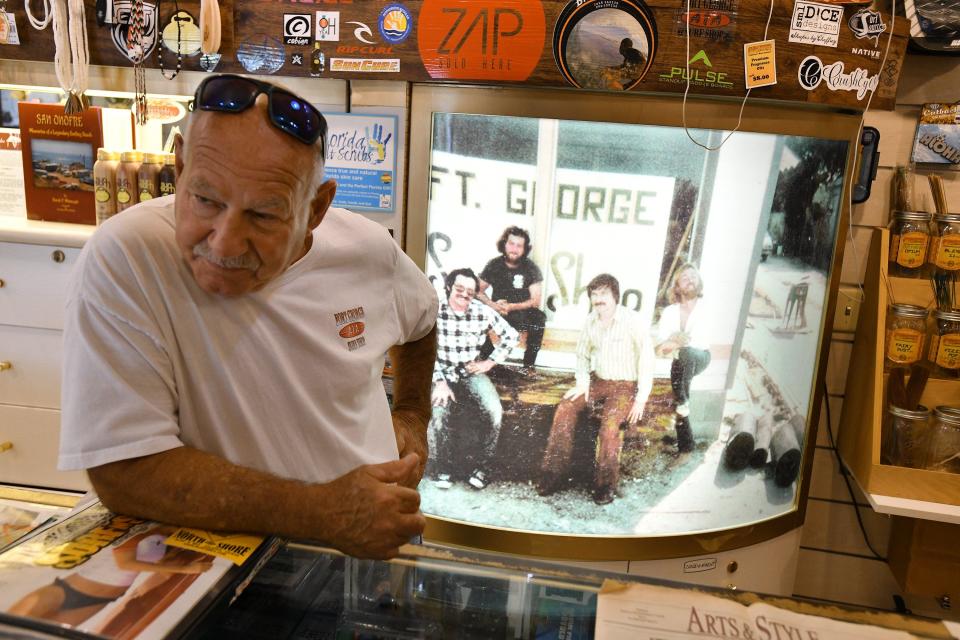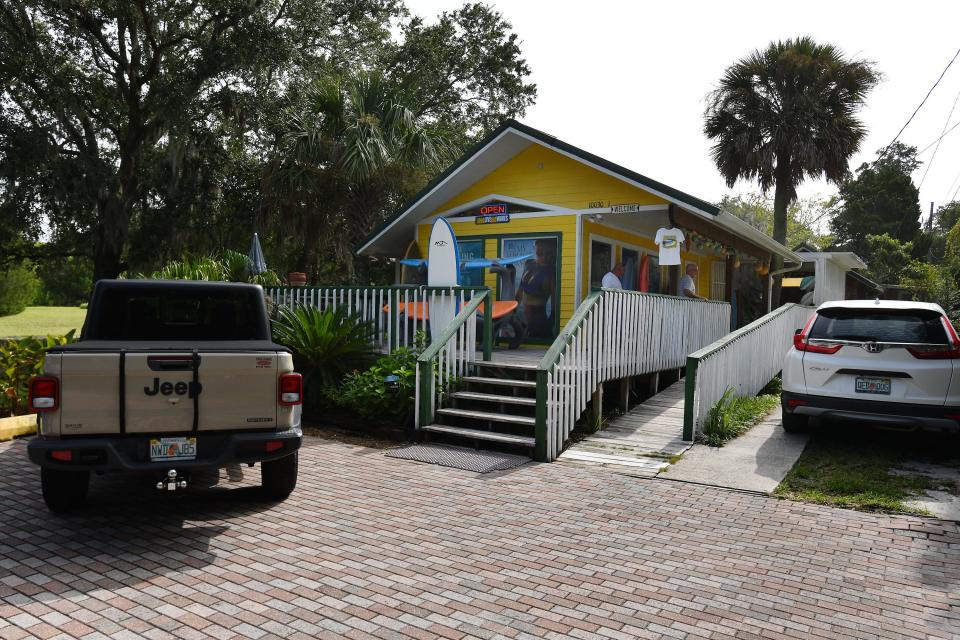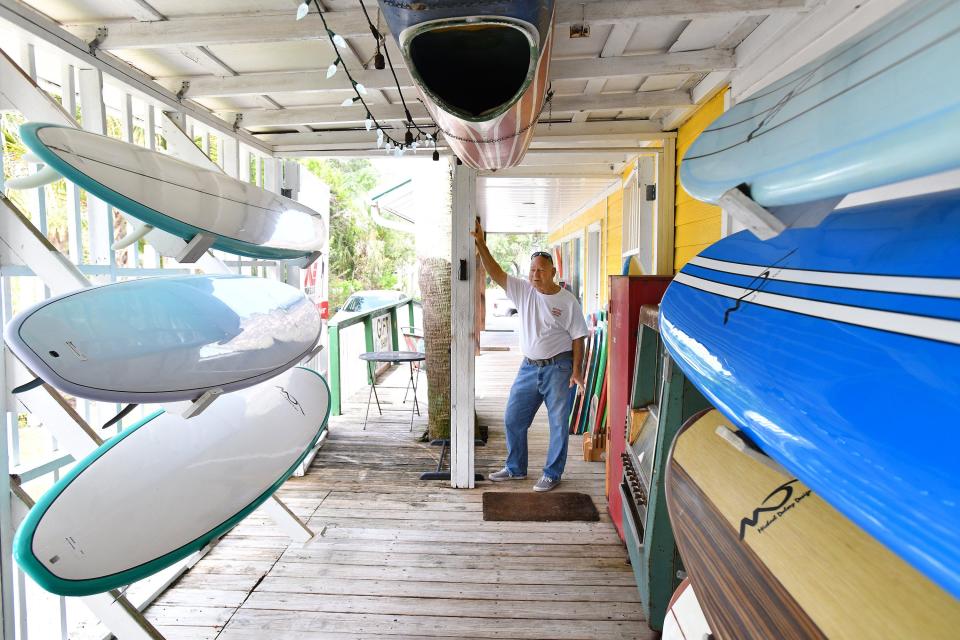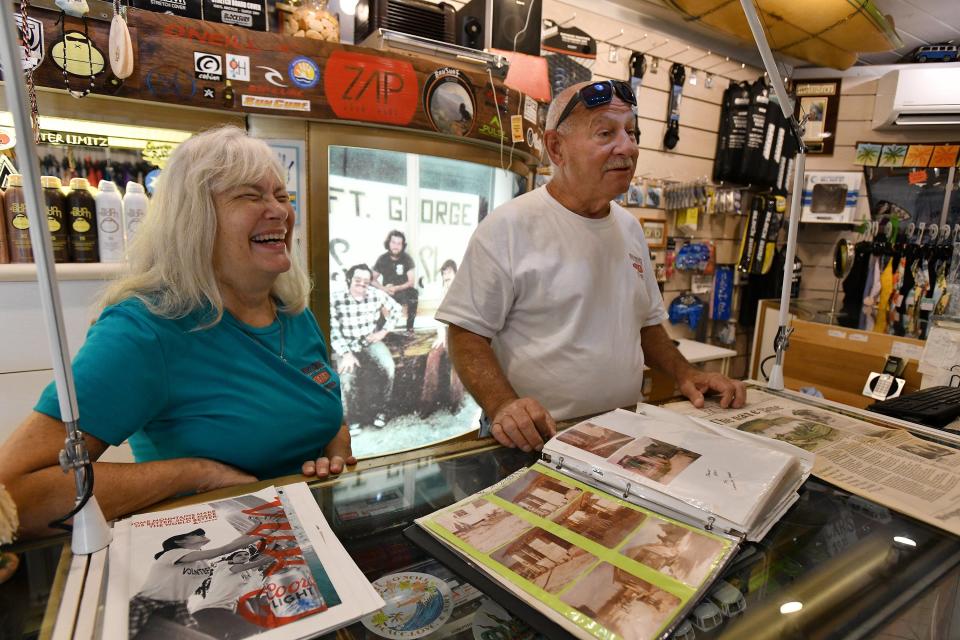After 49 years, Jacksonville surf shop on Fort George Island for sale. Memories included.
Jim Rodgers' surfing life began, as it did for so many who came of age in the 1960s, with "The Endless Summer," the sunny travelogue about two surfers' global search for the perfect wave. Sitting in the theater, he could think of no better way to spend a life.
Then, fishing with his dad at the north jetty of the St. Johns River, he saw two guys on big old surfboards. There it was, in real life: surfing. He ditched the fishing rod and begged for the chance to ride one of the boards. He flailed in the whitewater, like any other beginner, but the surfing hook was set.
Rodgers lived with his family in the old Brentwood public housing projects north of downtown Jacksonville, the same humble neighborhood where Mayor Jake Godbold grew up before him. Rodgers was 15, maybe 16, and didn't have a car or a reliable ride to the waves at the north jetty.
But he had a thumb. And soon he and his first board were catching rides on Heckscher Drive, which connects a salty necklace of houses, fish camps, islands and creeks along the north side of the St. Johns after the river makes its big turn east to empty into the Atlantic.

Luckily, getting rides back then wasn't terribly hard to do, since if your car went off the road, even a little bit, it was likely to get stuck in the thick sand at the sides. And it didn't hurt to have fit young surfers to help push you out.
A few years after graduating from Andrew Jackson High, he and his surfer buddy Joey Greene got a ride most of the way down Heckscher and were waiting for another when Rodgers took a good look at an old wood building off to the side of the road. It was a transplanted World War I-era Army barracks that had once been the Fort George Island post office. Its white paint had mostly peeled off, leaving bare wood behind. The goldenrod was growing higher than the building, which was tiny, compact.
"It looked," he said, "like the perfect place for a surf shop.”
Cheap lots and shark teeth
Rodgers opened Fort George Island Surf Shop (it later lost the Island part of the name) in 1974, almost 50 years ago. It's had its challenges and hasn't stayed open the whole time, but it's always been part of his life.
After months of working there seven days a week, he used it close it in the slow winters and do construction to keep money coming in. There was a terrible fire in 1994 (he's sure it was arson) that required an almost total rebuild of the tiny shop. And he sold the business once, while keeping the property; after the new owner moved to a busier spot, it sat vacant until Rodgers and his wife Debi restocked the shop and began all over again.
He says that he knew, even early, that he could make it work.
"Everybody said, 'The only thing you had going for you was enthusiasm,'" said Rodgers, a genial, self-deprecating 71-year-old with a laid-back Northeast Florida drawl and buckets of stories. "But I just seen the writing on wall: How could a place this wonderful sit there and deteriorate, past an old fishing village, with the cheapest lots in the city and it’s so wonderful out here? Then the Queens Harbour people started coming over looking, and said, ‘Eh, it’s too redneck for us.’ Well the rednecks are dying off, a thousand a week, so you know, everybody's more civilized as we move along."
Rodgers, who can spin a story, laughed as he talked of his early days out on the island when he worked as a busboy at the Buccaneer Restaurant on the river. Young men working in the kitchen made about $15 a night; women, with waitress tips, could make $100 a so.
"Every guy out here had a waitress girlfriend, because if he didn’t he didn’t have his rent money," he said. "So the first thing they said when I moved out here was ‘If you mess with any of our rent moneys, you’re a goner!'”

He's now a Fort George islander through and through. Not long after opening the shop, he built a house a half-mile from the store after buying two side-by-side island lots for a combined $3,600.
In a very Florida story, he got the money for those lots by getting on a plane, opening his briefcase at a museum in Ohio and selling the contents inside — his shark tooth collection, which he'd gathered at night after a dredging project on Amelia Island, and which included two teeth as big as his hand.
"He's a fascinating character. He's a Northside institution, Jimmy Rodgers," said Dick "Rozo" Rosborough, a longtime surfboard shaper on Fort George Island. "Surfing needs colorful people, you know, and he's one of them."
Surfer Dick Rosborough: 'I've always kept one step ahead of fame and fortune'
Rosborough, a member of the East Coast Surfing Hall of Fame who's pretty colorful himself, notes that it's often been challenging for Rodgers to keep the shop going, out there in a corner of the city that's long been less rich than others, and which remains pretty sparsely populated, with no big subdivisions or wide highways.
"But he's pulled it off," he said.
Surf shop for sale
The Fort George Surf Shop is making money, Rodgers said, and it's not a bad life; you can get into some good conversations, see the neighbors as they drop by and meet all the new people from all over as they pop in to see what's there.
Besides, people who come there are generally heading to the beach, he said, and that means they're usually happy.
The property is for sale now, listed at $895,000, including inventory and a small rental house out back. He and Debi are hoping the shop, which has long been painted a bright yellow, can stay a surf shop.
Surfin' USA: In the summer of 1964, everybody went surfing
Fort George Island needs a surf shop, they say, as do the many newcomers moving in nearby, and all those passing by on the way to Huguenot Park, home of the north jetty, and to ritzy Amelia Island to the north. And he and Debi say they're happy to stay on for a bit and ease the transition.
But they've been there a long time, and it's time for a change, for new things. She'd like to visit her sons more, and he's got a gold mine out west he wants to explore. His home base will still be Fort George Island, since he'd like to surf more than he does now, but that mine is calling him.

He'd never been west of the Mississippi River until he saw something online about leasing 20-acre lots in gold country, and after some research they checked out the property, which is split by a dry river canyon with lots of interesting rocks, and saw mining operations in a box canyon nearby.
That seemed a good plan, Rodgers said, and the desert seemed a good place to switch things up.
"So I’ve got a gold mine in Arizona now, between Congress and Wickenburg, Arizona," he said. "I go there, and sit on that hill, and think about my son.”
Changes and challenges
Rodgers' son, Sean, was 38 when he died of a heroin overdose. "Found him on the floor," Rodgers said, "eight years ago."
He talks about belonging to that terrible club of parents who've lost children, and how you're just never the same after.
Debi Rodgers saw his pain. She and Jim had become close in the early 1970s, right after high school. She was a Westside girl, while he was Northside, but they became friends during the hippie days of Jacksonville's Riverside neighborhood.
They eventually lost touch, though. But after they'd each gone through divorces, she dropped by the surf shop, not sure if he still owned it, but curious. It turned out, of course, that he still did own it, but she admits she didn't recognize the one-time long-haired surfer boy.
“He’d changed considerably," she said.
“Hair was gone,” he said.
“Yeah," she said, laughing. “I wasn’t even sure it was him, but he opened his mouth and there was that same voice coming out. That never changes.”
They got married 13 years ago.
About that time, they sold the shop, while keeping the property. But the new owner moved his surf shop business to the other side of the river after two years, and the old Fort George shop sat empty, as Rodgers picked up some shifts at Aqua East Surf Shop in Neptune Beach.
In 2014, though, he suffered a heart attack.

Debi Rodgers, who had retired the year before after 41 years at AT&T, was worried about his recovery. He knew he needed to get up and get active.
By January 2015, he was still lying on the couch. “He’s got to move," she said, "so that’s when I said, 'Why don’t we open up the shop again — but let’s not work seven days a week.' He popped up off of that couch with a sparkle in his eye. I said, 'That’s what it’s going to take.'”
They picked up some glass counters, clothing racks and a mirror from the old Belks store at Regency Square, brought all that out to Fort George Island and started ordering some inventory. They reopened in April 2015, with Debi joining Jim at work there.
Two weeks after opening, Jim Rodgers found his son dead. Jim and Debi Rogers closed the store for a short while, but then they both went back to work. It was, she said, like life support.
She wants him to write a book, stories about the island, because he knows so much about the old characters who lived there and about the waterways that wind around it. And people often come in to the store and listen to his stories and tell some of their own.
“He knows the old island, the way it was. There’s been a lot of changes, so we need the new people to know the old history," she said.
Still, is he ready to retire, almost a half-century after recognizing that the old Army barracks on Heckscher would make for a fine little surf shop?
“Semi-ready, yeah," Debi Rodgers said. "He says, ‘I don’t have anything left to prove, after 50 years.' And when his son passed away, he used this as a crutch, to help healing and by talking about it. He’s not a guy who likes to make a lot of changes in his life, so he was just happy here. I think there’s a part of Jim that would just work here until he dies, because he likes to talk.”
This article originally appeared on Florida Times-Union: Jacksonville surf shop that opened in 1974 is now on the market

